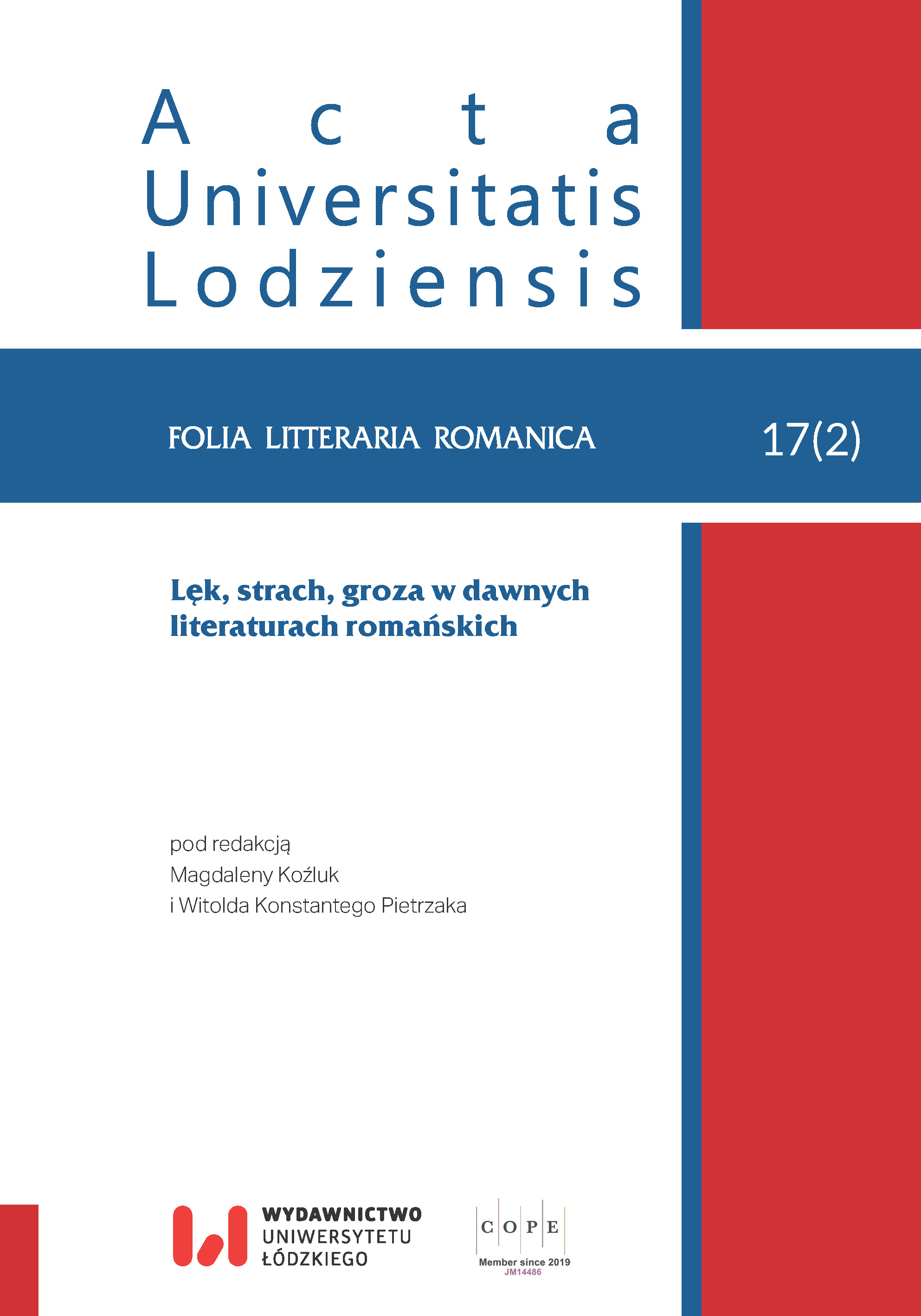Strach jako narzędzie władzy w pismach historiograficznych Tacyta
DOI:
https://doi.org/10.18778/1505-9065.17.2.02Słowa kluczowe:
Tacitus, fear, power, history of RomeAbstrakt
Tacitus’texts are permeated with fear. This effect is reached as a result of the use of a rich vocabulary related to fear and numerous scenes in which fear plays a major role. The structure of Tacitus’stories is in fact composed of the overlapping kinds of fear caused and felt by people in power, participating in its execution, aspiring to hold it and subjected to it. Consequently, the stories expose the mechanism of Roman power, which was driven and fueled by fear. The reason why Tacitus used the description of fear in the historical texts also seems to be significant. The aim of this article is therefore to look at the semantic layer of the words that the historian used to illustrate fear, to emphasize the aspect of power within interpersonal relations, which were almost entirely based on fear, and to indicate the reason that could have prompted Tacitus to use this feeling in presenting the history of Rome.
Pobrania
Bibliografia
Cornelii Taciti libri qui supersunt Ab excessu Divi Augusti, t. I, ed. Erich Koestermann, Lipsiae, B. G. Teubner, 1965
Google Scholar
Cornelii Taciti libri qui supersunt Historiarum libri. Germania. Agricola. Dialogus de oratoribus, t. II. 1-2, ed. Erich Koestermann, Lipsiae, B. G. Teubner, 1969-1970
Google Scholar
DOI: https://doi.org/10.1515/9783110958843
Conde Calvo, Juan Luis, “Los valores concretos de ‘metus’ y ‘terror’ en Tácito”, in Mnemosynum. C. Codoñer a discipulis oblatum, ed. Augustín Ramos Guerreira, Salamanca, Universidad de Salamanca, 1991, s. 55-62
Google Scholar
De Vivo, Arturo, “La violenza e il terrore: le forme del potere in Tacito”, in Terror et pavor. Violenza, intimidazione, clandestinità nel mondo antico. Atti del convegno internazionale, Cividale del Friuli, 22-24 settembre 2005, ed. Gianpaolo Urso, Pisa, Edizioni ETS, 2006, s. 275-288
Google Scholar
Ernout, Alfred, Philologica, t. II, Paris, Libraire C. Klincksieck, 1957
Google Scholar
Gernia, Pier Carlo, L’uso di metuō, timeō, vereor, formīdō, paveō e dei termini correlati nel latino arcaico e classico. Contributo allo studio delle ‘differentiae verbōrum’, Torino, Accademia delle Scienze, 1970
Google Scholar
Heinz, Wolff-Rüdiger, Die Furcht als politisches Phänomen bei Tacitus, Amsterdam, B. R. Grüner, 1975
Google Scholar
Kapust, Daniel, “On the Ancient Uses of Political Fear and its Modern Implications”, Journal of the History of Ideas, 2008, t. 69, no 3, s. 353-373, https://doi.org/10.1353/jhi.0.0003
Google Scholar
DOI: https://doi.org/10.1353/jhi.0.0003
Levene, David Samuel, “Pity, Fear and the Historical Audience: Tacitus on the Fall of Vitellius”, in The Passions in Roman Thought and Literature, ed. Susanna Morton Braud and Christopher Gill, Cambridge, Cambridge University Press, 2006, s. 128-149, https://doi.org/10.1017/CBO9780511586163.010
Google Scholar
DOI: https://doi.org/10.1017/CBO9780511586163.010
Marincola, John, “Beyond Pity and Fear: The Emotions of History”, Ancient Society, 2003, t. 33, s. 285-315
Google Scholar
DOI: https://doi.org/10.2143/AS.33.0.503603
Mastellone Iovane, Eugenia, Paura e angoscia in Tacito. Implicazioni ideologiche e politiche, Napoli, Loffredo Editore, 1989, https://doi.org/10.2143/AS.33.0.503603
Google Scholar
DOI: https://doi.org/10.2143/AS.33.0.503603
Megallón García, Ana Isabel, “El campo léxico de los sustantivos de ‘temor’ en los Anales de Tácito”, Habis, 1994, t. 25, s. 151-172
Google Scholar
Schmidt, Ernst Alexander, “Die Angst der Mächtigen in den Annalen des Tacitus”, Wiener Studien, 1982, t. 95, s. 274-287
Google Scholar
Tacyt, Dzieła, przeł. Seweryn Hammer, Czytelnik, Warszawa 2004
Google Scholar
Thomas, Jean-François, « Le vocabulaire de la crainte en latin : problèmes de synonymie nominale », Revue des Études Latines, 1999, t. 77, s. 216-233
Google Scholar
Wiseman, Timothy Peter, Historiography and Imagination. Eight Essays on Roman Culture, Exeter, University of Exeter Press, 1999
Google Scholar
Woodman, Anthony John, Rhetoric in Classical Historiography. Four Studies, New York, Routledge, 2003, https://doi.org/10.4324/9780203480533
Google Scholar
DOI: https://doi.org/10.4324/9780203480533
Woodman, Anthony John, “Tiberius and the Taste of Power: The Year 33 in Tacitus”, The Classical Quarterly, 2006, t. 56, no 1, s. 175-189, https://doi.org/10.1017/S0009838806000140
Google Scholar
DOI: https://doi.org/10.1017/S0009838806000140
Zuccarelli, Ugo, “Una nota sull’uso dei verba timendi nella narrazione Tacitiana”, Giornale Italiano di Filologia, 1999, t. 51, s. 107-113
Google Scholar
Pobrania
Opublikowane
Wersje
- 2023-08-10 - (2)
- 2022-12-30 - (1)
Jak cytować
Numer
Dział
Licencja

Utwór dostępny jest na licencji Creative Commons Uznanie autorstwa – Użycie niekomercyjne – Bez utworów zależnych 4.0 Międzynarodowe.













